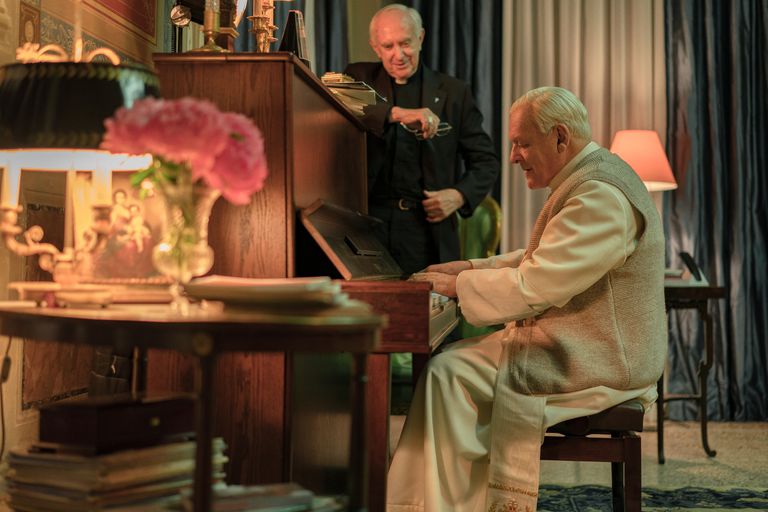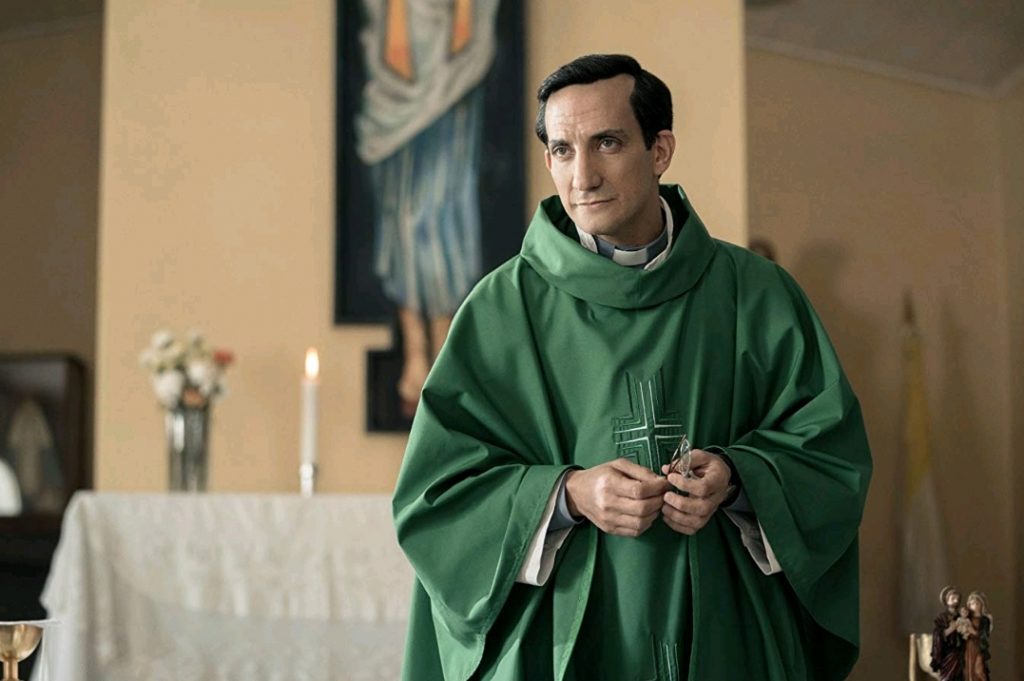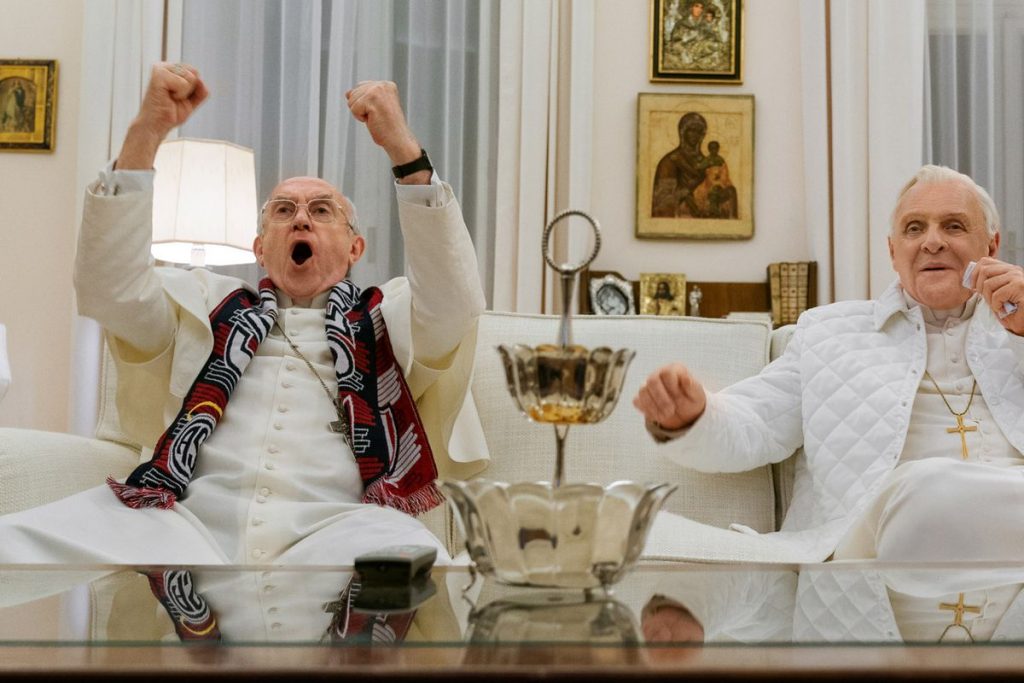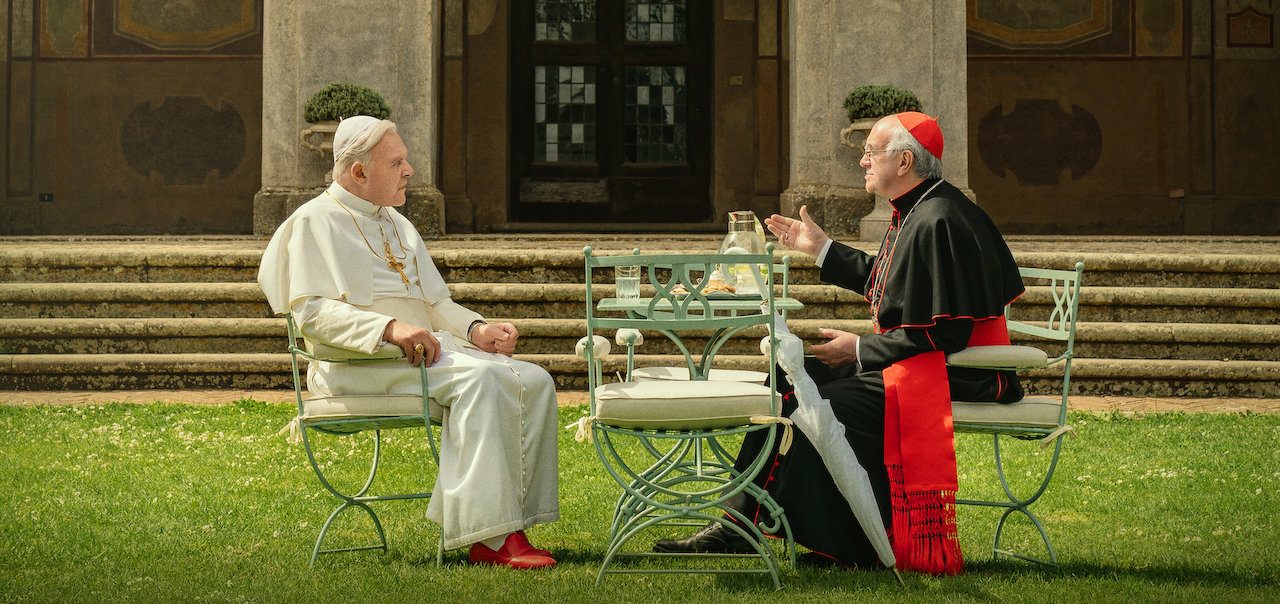Over the years, people have moved away from religion and questioned the existence of God in an attempt to find peace elsewhere. This is because our religious structures remain rigid, and are unable to move and change with the times. They have also become increasingly political, and end up being exclusive in nature. It is like people are losing connection as everything about religion begins to feel empty. This is precisely what Netflix‘s latest biographical drama, ‘The Two Popes‘ explores through its narrative.
The film is a biographical drama directed by Fernando Meirelles of ‘City of God’ and centers around imagined conversations between Pope Benedict and Cardinal Bergoglio (before he became Pope Francis) in 2012, as Benedict decides to resign. ‘The Two Popes,’ written by Anthony McCarten, is a film adaptation of McCarten’s play, titled ‘The Pope.’ It creates a much-needed dialogue between the traditional and progressive sides of the Catholic Church, as these two men with vastly different views come together for the greater good of the Church and its people.
Plot Summary

The film begins in 2005 as Pope John Paul II passes away and a papal conclave is conducted for the election of the new Pope. Here, we’re first introduced to Cardinal Ratzinger, played by Anthony Hopkins, and Cardinal Bergoglio, played by Jonathan Pryce. As the voting takes place we realise that Ratzinger will soon be the pontiff but he faces a tough competition by Bergoglio. The elections end up being more of a battle between the conservatives and the liberals.
Ratzinger soon becomes Pope Benedict XVI, and his victory demonstrates the Church’s unity despite their differences. Benedict is a conservative and reaffirms the traditional Catholic identity. Over the years, he gets caught in several scandals that had actually preceded his tenure, like the sexual misconduct scandal and Vatileaks. Though not directly involved, he begins to get criticized for not making the required reforms. Around the same time, Bergoglio, in Argentina, is considering his own resignation. He writes letters to the Pope about the same who summons him to Rome.
The pope and the cardinal, over the course of the film, have several conversations and heated discussions over their beliefs, faith, and the role of the Church. The two hardly meet eye to eye and disagree with each other on most things. But over time, despite this, the two form an unlikely friendship as they continue to have these conversations. The two bond over music, their pasts, and the connection (or the lack of it) they feel towards God. Throughout the film, Benedict continues to avoid signing Bergoglio’s resignation, it is finally revealed that the Pope himself has decided to resign. This leads the two to confront their pasts and share the burden of their personal guilt.
Pope Benedict’s Resignation

Pope Benedict’s resignation marks a pivotal point of ‘The Two Popes’. Though the film primarily focuses on Bergoglio and his journey, Benedict’s character offers a sense of balance to his views, both about himself and the Church. It is ultimately his sudden declaration of his resignation and, later, his confession that ends up providing the resolution that Bergoglio needs for his own guilt and doubts. Despite their differences, both the popes actually need each other. This is why Benedict’s choice to resign and his wanting Bergoglio to be his successor become so important.
In a touching scene, Benedict reveals that over the past few years, he has begun to question his purpose and feels that he needs a spiritual hearing aid to listen to God. He talks of how he has begun to notice that the smoke no longer rises with the candle and that he believes that maybe it’s time for change. He confesses that he had been waiting for a sign from God, and one thing that was stopping him from resigning was the thought that Bergoglio would take over. Until he met him. As the two conversed, he changed his mind and realized that the Church needed someone like Bergoglio to make reforms.
Bergoglio obviously does not take it well as popes aren’t supposed to retire, no Pope in the past 600 years resigned and believes that Benedict’s decision could potentially damage the papacy forever. He continues to convince Benedict against it, but it is eventually revealed that it is Bergoglio’s own self-doubt and the guilt that he is burdened with from over the years that make him believe that he is not capable of being the pontiff.
Bergoglio’s Flashbacks

Bergoglio’s past forms a crucial part of the film as it reveals his journey from the time he felt his calling to the mistakes he made in his career to his becoming a liberal reformer of the Church. The flashbacks begin when the two popes discuss their callings. It is through the flashbacks that we learn that Bergoglio was once going to marry Amalia but was still in doubt about his priesthood until he felt a sign from God. He is walking by a church and impulsively enters it just as he is going to meet his fiance. He then meets a priest who calls him and converses with him over a confession. It is here that he realizes the sign from God and decides to break off his engagement.
The next most important part of Bergoglio’s past is also his confession to Benedict, as he tells him about the tremendous amount of guilt and self-doubt he is burdened with because of what happened during the “Dirty War” in Argentina and his incapability to do something for his people and the difficult decisions he had to make. This becomes extremely important as it explores what the movie is primarily about. “The Two Popes,” at its core, is a film about guilt, forgiveness, and having faith.
Bergoglio then spends several years serving the refugees and doing all that he didn’t do earlier. He begins to grow and change his views, which makes him more liberal in his approach to things. The flashback marks certain important scenes, like the one where he compares the connection to God as the TV connection that sometimes works and sometimes doesn’t. More importantly, the flashback scenes reveal Bergoglio’s vulnerabilities and explore the fact that popes are ultimately only human and that mistakes sometimes bring us to the right path – echoing his first speech at the beginning of the film.
The Ending

The last half an hour of ‘The Two Popes’ perhaps marks its most important part as the scenes explore the concept of forgiveness in a touching and real manner. Benedict reminds Bergoglio that he must believe in the mercy that he preaches after listening to his doubts. The two then head to the Chamber of Tears, where they share Pizza and drink Fanta, and continue conversing about their pasts. Benedict reveals why he wants Bergoglio to succeed him as he believes that, unlike others, Bergoglio leads by the way he lives and has lived. He has actually changed from his mistakes and made amends to become a better person.
Benedict states, “We’re all sinners”, and then goes on to make a confession to Bergoglio. He reveals his past, of how he hid behind books because he was scared to taste life, and that eventually made him empty and void of the world that the Church is meant to help. Something he believes that Bergoglio would do. He then goes on to confess to his lack of involvement in the sexual abuse scandal, though he did end the service of Marcial Maciel Degollado, an influential Mexican priest with a long trail of accusations, and also tried to make amends with the victims. He did turn a blind eye to certain cases. This is, of course, not revealed in the film, and the scene is entirely marked with silence and expressions, and thus in many ways, actually makes Benedict’s confession all the more powerful.
The scene that follows only makes the previous one more heartwarming as Benedict finally decides to engage with the people as he walks out of the Chamber. In an awkward and heartfelt farewell, the two popes hug and briefly try to tango together. It is at this moment that the audience realizes how much the two need each other for their own growth. The movie ends with Pope Benedict resigning and Pope Francis coming to power and addressing necessary topics of economy, climate change, human rights, etc.
The last scene of ‘The Two Popes’ wraps up this wholesome, heartwarming film about forgiveness in a humorous way, with the two popes sitting together and watching the football World Cup finals of 2013. The two banter and laugh during the Argentina vs. Germany (Benedict’s homeplace) match, revealing how far they have come in their journey together. Not necessarily their religious journey but their journey of faith and learning. The last scene also captures the spirit of the two characters in a beautiful way as they both embrace change.
What makes “The Two Popes” such a remarkable film is the fact that it is essentially about a universal need for mercy and forgiveness. Unlike what one expects, the film is not about a power struggle between two opposing sides but a coming together of those sides as they wrestle with their own doubt and fallibility. It is ultimately a heartwarming story about hope and an unlikely friendship that teaches us that there is always room to grow and to show mercy in the most delicate way.
Read More: Is The Two Popes Based on a True Story?


You must be logged in to post a comment.